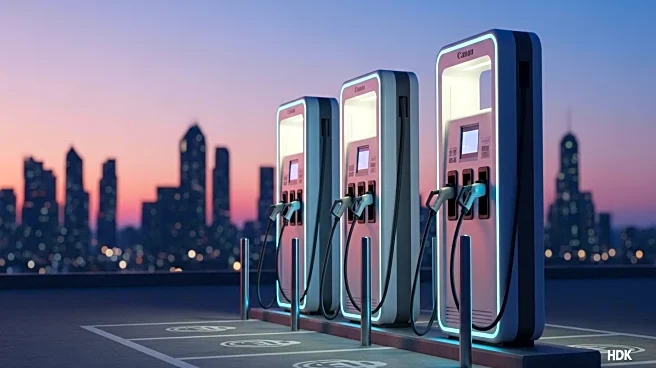What's Happening?
Stellantis has announced that Jeep, Dodge, Chrysler, and Fiat vehicles will continue to qualify for the $7,500 electric vehicle (EV) tax credit beyond the federal deadline. This decision comes as Stellantis aims to boost its presence in the U.S. market, where it sold 324,825 vehicles in the third quarter under its various brands. The company offers a limited range of all-electric vehicles, including the Jeep Wagoneer S and Dodge Charger Daytona EV, alongside several plug-in hybrid models. Notably, the Jeep Wrangler 4xe remains the best-selling plug-in hybrid electric vehicle (PHEV) in the U.S., with sales increasing by 18% in the third quarter. Stellantis plans to honor the tax credit for EVs and PHEVs, but the offer is restricted to vehicles currently in dealer inventory, which may run out at any time.
Why It's Important?
The extension of the EV tax credit by Stellantis is significant for the U.S. automotive market, particularly as the company seeks to strengthen its foothold amid growing competition. By maintaining the tax credit, Stellantis aims to attract more consumers to its EV and PHEV offerings, potentially increasing sales and market share. This move aligns with strategies employed by other automakers like Ford, GM, and Hyundai, who are also continuing to offer the credit. The decision could benefit consumers looking for affordable EV options, while also supporting Stellantis' transition towards more sustainable vehicle production. However, the limitation to existing inventory may pose challenges for consumers and dealers alike.
What's Next?
As Stellantis continues to offer the EV tax credit, the company may face inventory challenges, potentially impacting availability for consumers. Dealers will need to manage stock carefully to maximize the benefits of the credit. Additionally, Stellantis may explore expanding its EV lineup to meet increasing demand and further capitalize on the tax credit extension. The automotive industry will likely monitor Stellantis' strategy closely, as it could influence competitive dynamics and consumer preferences in the EV market. Stakeholders, including environmental groups and policymakers, may also react to how this decision aligns with broader sustainability goals.
Beyond the Headlines
The decision by Stellantis to extend the EV tax credit highlights broader industry trends towards electrification and sustainability. As automakers increasingly prioritize eco-friendly vehicles, the role of government incentives becomes crucial in shaping market dynamics. Stellantis' move may prompt discussions on the effectiveness of such credits in driving consumer behavior and accelerating the transition to electric mobility. Additionally, the focus on inventory-based offers raises questions about supply chain management and the ability of manufacturers to meet growing demand for EVs.









